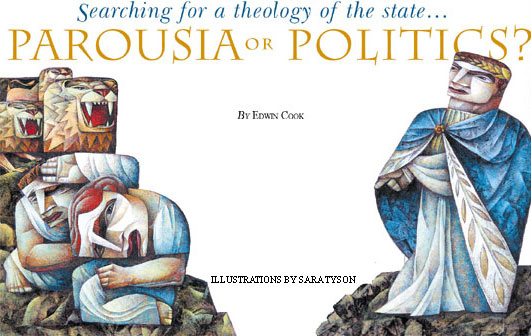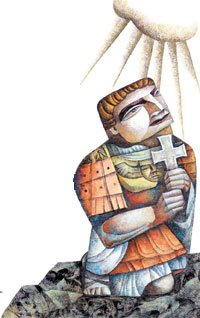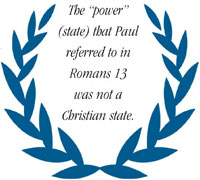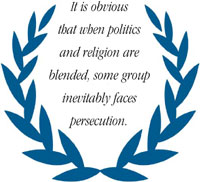Parousia or Politics?
Edwin C. Cook January/February 2005
Getting your Trinity Audio player ready...

"As a statement of general principle Romans 13:1-7 has for centuries provided biblical validation for a theology of the state–as the secular arm of the one divinely ordered commonwealth (Corpus Christianum), or as an essential expression of the order of creation or of natural law in the overall scheme of things." It has also been used to justify the spiritual theocracy of the Papacy in the Middle Ages. However, in modern times the rise of the totalitarian state, with its consequent abuse of power, has led theologians to reexamine this passage in attempts to understand how Christians should face such a political regime. More specifically, misinterpretations and misapplications of this passage have resulted in Christian support of such regimes as the Third Reich, and Christian advocacy of such political ideologies as apartheid in South Africa.
In view of such diverse approaches to politics within Christianity in modern times, the question naturally arises: "What emphasis, if any, did primitive Christians place upon politics?" Related questions are "What was the political climate of first-century Christianity?" and "What relationship was sustained between Christianity and the Roman government?" A question worthy of equal consideration is "How did belief in the Parousia (the second advent of Christ) affect relations between early Christians and the Roman government?" A brief historical review of existing conditions during the emergence of Christianity and its existence from the first through the fourth centuries provide answers to these questions.
The Roman Religions
Although the state (Roman Empire) fulfilled the role of common guardian to all religions, it was more partial to polytheistic religions because they did not pose a threat to the gods of Rome. Additionally, two primary "divinities," Rome and Augustus, were universally worshipped and, as such, sanctioned the official side of religion. These two deities were so integrally associated with the other gods of Rome that to deny their worship caused one to be viewed as "outside the national religion," and thus considered to be an atheist. Furthermore, it was commonly held that these two deities incarnated all state officials, eventually leading to the development of emperor worship. Moreover, their worship may rightly be identified as a fitting representation of the religion of the state, of "loyalty to the Empire," and the one common element uniting the whole empire.
In antiquity, citizens of each state owed allegiance to the gods of that state. By policy, foreigners who were domiciled in lands other than their patria were allowed to worship the gods of their native land. As the Roman Empire expanded, this policy was implemented more frequently and was facilitated by foreign religions, all of which were nonexclusive toward other religions. When Rome granted citizenship to inhabitants of conquered lands, the result was a fusing of religions. Such persons were required to render allegiance to Rome through emperor worship and were allowed to worship their native gods. Thus, when emperor worship was associated with allegiance to Rome and therefore viewed as a symbol of political conduct, it posed grave consequences for Judaism and Christianity, both of which were monotheistic.
When Rome conquered the Jews, the Jews showed charters granted them that allowed them to observe their particular religious rites, which the Romans acknowledged. In places where Jewish colonies existed without charters, particularly in Rome, they were granted alien rites. After the destruction of the Jewish Temple, the Emperor Vespasian redirected the payment of the didrachma for the Jewish
Temple to the Temple of Jupiter Capitolinus. The Jews had no complaints of this god, or the state under his guardianship, since they were allowed to retain their former privileges. Thus, Judaism remained an authorized religion (religio licita), in contrast to Christianity, which became a proscribed religion (religio illicita), especially once the Romans distinguished the differences between the two.
Since they were identified as a religio illicita, Christians, if denounced and condemned, faced the death penalty; conversely, if they abjured Christianity by sacrificing to the gods, such repentance secured pardon. The only plausible grounds for their persecution was that they bore the name Christian, since upon examination they were found to be blameless of any purported crimes. Under such circumstances most Roman emperors slackly administered the law, even placing some restraint upon municipal magistrates and provincial governors. Nonetheless, the law was part of state policy and was upheld at times. Thus, while providing no security to Christians, the practices of second-century emperors were vastly distanced from the policy of extermination followed by Decius and Diocletian in later years.
The Relationship Between Jews and Christians

The Status Between
Christians and the Roman Government
As a general rule the Roman government was tolerant toward all religions. It was more concerned with preserving public order than with the petty disputes among religions. However, it did not follow a policy of toleration when a religious practice threatened the stability or morality of the empire.
Apart from those occasions when it persecuted Christians, and apart from its blatant idolatry, Christians regarded it in a positive light. From the first-century Christian worldview, they believed it would endure until the second advent of Christ and thus serve as a barrier to the terrors of the last days. Christians interpreted it as the power that "restrained" the anti christ and held in check the mobs that would otherwise destroy them. Christians saw the obvious benefits of the empire that helped promulgate Christianity, such as "[the Pax Romana], uniformity of language and ideas, and rapid and safe communication."
Christianity, in relation to the Roman Empire, gradually came to be viewed as a "state within a state" because it established its own system of handling legal disputes, developed its own organizational structure, and had its own system of electing local church leaders. While there were interrelations between the church and the Roman Empire, each was exclusive in its own sphere until the fourth century. As belief in the imminence of Christ's return began to wane, believers began to focus on two primary concerns: the church, and the state as the sphere of the church's life. Church leaders and apologists were generally supportive of the Roman government through the of the fourth century, with the exception of those emperors who instigated widespread persecution of Christians, came to interpret Romans 13 and Revelation 13 as dialectical counsel that on the one hand, presented the state as the instrument of God to establish order and peace, and on the other hand, described the state as the agent of demonic power that would persecute Christians.
Eusebius was the individual who played the most important part theologically in the union of church and state in the fourth century. The source for this union was a shift in theological focus by Eusebius. Hornus states, "Thus it was Eusebius who marked the departure of Christian thought–in its conception of the state as well as in numerous other areas–from the dialectical approach which until then had been its strength."
He continues explaining: "Eusebius had completely lost the apocalyptic perspective: for him there remained only Romans 13 and a near deification –at least by proxy–of the power which, because it existed, had necessarily been appointed by God. As a result, 'empire and state were in fact the ultimate realities. The theology of history had become useless and had been completely transformed into a political theology. It had once and for all become static.'"
In addition to Eusebius' influence, the conversion of Emperor Constantine had a great impact upon his reign over the Roman Empire. E. Glenn Hinson states, "From his conversion until about 324, when he took up the fight against Licinius, Constantine extended tolerance to other religions and displayed limited favoritism to Christianity. From 324 to 330, he adopted a harsher attitude toward paganism and leaned ever more heavily on the churches. After 330, he dropped all pretense of toleration and did all he could to eliminate paganism as well as divergent forms of Christianity."
Summary

To begin, the "power" (state) that Paul referred to in Romans 13 was not a Christian state. To the contrary, the Roman government was not only polytheistic but was even opposed to Christianity. The Roman government maintained a broad policy of toleration for other religions, but reserved the right to control and even prohibit such religions if they threatened the unity of the empire. The government allowed foreign worship practices for those religions designated as religio licita, thus implying that the government had also the prerogative of reviewing, examining, and determining the claims of each religion and its right to exist. The one "national religion" (if such it could be called), promoted by the Roman government, was emperor worship, which was mandatory for citizenship status.
From another religious perspective, Judaism enjoyed the privileged status of religio licita. Since Christianity had its birth from within Judaism, it too enjoyed the protection afforded this status until roughly after A.D. 60, when it was distinguished from Judaism. Judaism was the primary antagonist to Christianity in its beginnings because of inherent doctrinal differences between the religions. Additionally, Judaism strongly influenced Christianity primarily through Jewish converts to Christianity who had concern over Jewish legalistic and sacrificial practices. Although not directly influenced by Jewish nationalism and zealotism, enough danger from these influences was present at the time of the writing of Romans so that Paul expressed his concerns to Christians in that letter by admonishing them to submit to Roman rule.
Once distinguished from Judaism, Christianity was labeled as religio illicita. It suffered persecution from the Roman government for a variety of reasons. Politically, it was viewed as a threat to the Roman government because of its internal structure of governance and its unity that was independent of Rome. From this perspective it could be classified as a "state within a state." Socially, it was viewed as advocating strange customs and causing familial divisions. Religiously, it was viewed as hostile to the Roman pantheon, and especially because of its monotheistic nature, its adherents were labeled as "atheists" because they would not render allegiance to Rome and its gods through emperor worship. Patriotically, it was viewed as in opposition to the well-being of Rome and its citizenry because its followers would not fight in wars, nor would they offer supreme allegiance to Rome through emperor worship. Mystically, it was viewed as the curse upon the empire and the cause of the wrath of the gods, because of famine, pestilence, and wars that began to plague the empire during the second century.


___________________________
Edwin Cook is a minister of religion in Alabama. He is currently also studying for an MA in religious studies with a focus on church-state relations at a university in Collegedale, Tennessee.
1 James D. G. Dunn, "Romans 13:1-7– A Charter for Political Quietism?" Ex Auditu 2 (1986): 55; Ernst Kasemann, Commentary on Romans (Grand Rapids: Eerdmans, 1980), p. 354.
2 Philip Schaff, History of the Christian Church (Peabody, Mass.: Hendrickson Publishers, 1996), vol. 6, pp. 25-29.
3 Kasemann, p. 351.
4 "Among theological ethicists there is now a consensus about the impossibility of seeing Romans 13 as an entire doctrine of the state which can be used for almost all occasions concerning the state of our time. Without any hermeneutical reflection the Pauline text can easily be misinterpreted and misused in ethical situations vastly different from that of the Roman Empire in the middle of the first century." Torleiv Austad, "Attitudes Towards the State in Western Theological Thinking," Themelios 16, no. 1 (Oct./Nov. 1990): 19.
5 Ibid., p. 20. See also Ronald W. Johnson, "The Christian and the State: Romans 13:1-7," Review and Expositor 97, no. 1 (Winter 2000): 93; and Jeffrey Shearier, "The Ethics of Obedience: A Lutheran Development," Concordia Journal 12, no. 2 (Mar. 1986): 55.
6 Winsome Munro, "Romans 13:1-7; Apartheid's Last Biblical Refuge," Biblical Theology Bulletin 20, no. 4 (Winter 1990): 161-164.
7 The Roman government reserved to itself the right to decide which foreign cults and gods would be officially adopted, and thus sanctioned for worship (F. J. Foakes-Jackson, The History of the Christian Church: From the Earliest Times to A.D. 461 [New York: Richard R. Smith, Inc., 1930], p. 45; W. R. Halliday, The Pagan Background of Early Christianity [New York: Cooper Square Publishers, Inc., 1970], p. 21). Additionally, it maintained the right to control all religions and to suppress those that threatened the unity of the empire (Halliday, pp. 22, 23). One example of this is notable, the case of the religion of the Druids, which Rome expressly forbade (W. M. Ramsay, The Church in the Roman Empire Before A.D. 170 [New York: G. P. Putnam's Sons, 1912], p. 354). Rome's decision was predominantly based on political considerations rather than religious, since the Druidic religion was used as an instrument for nationalist agitation against Roman rule (Ramsay, p. 354; Halliday, p. 23).
8 Harold Mattingly describes polytheism as being more tolerant toward other religions because by nature it tends toward inclusiveness (Harold Mattingly, Christianity in the Roman Empire [New York: W. W. Norton and Company, 1967], pp. 18, 19, 22). Additionally, Walter Hyde defines the Roman religion itself as being "a formal polytheism characterized by ritual ceremonies" (Walter Woodburn Hyde, Paganism to Christianity in the Roman Empire [Philadelphia: University of Pennsylvania Press, 1946], p. 11.
9 Louis Duchesne, The Early History of the Church, (Edinburgh: Oliver and Boyd, Ltd., 1947), p. 76.
10 Jean-Michel Hornus (p. 23) notes, "The practice of emperor worship had evolved over several centuries. In 29 B.C., at the initiative of the local inhabitants, the first temple to Augustus was built at Pergamum. From that place the new cult of Caesar spread throughout Asia and then across the whole empire." He further notes (p. 25) that although this form of worship must have been a source of conflict for Christians since the birth of Christianity, it did not take official, final form until A.D. 291 when the emperors officially proclaimed themselves as "gods and sons of gods" (Jean-Michel Hornus, It Is Not Lawful for Me to Fight: Early Christian Attitudes Toward War, Violence, and the State [Scottdale, Pa: Herald Press, 1980]).
11 Duchesne, pp. 6, 7; Hornus, pp. 24, 25; Hans Lietzmann, A History of the Early Church, volume 1, The Beginnings of the Christian Church (New York: The World Publishing Company, first published 1937, translation revised 1949, 1953), p. 168.
12 Mattingly, p. 27; Halliday, p. 24.
13 Hornus, p. 24; Lietzmann, p.167; Hyde (p. 10) describes the Roman religion as more adapted to public life than to the individual. It is precisely for this reason that its "priests were always State officials, temples and altars were supported by State monies, ceremonies were supervised by the State and religious law administered in State courts." He concludes by stating, "Thus Roman religion remained to the end the formal faith of the State rather than the expression of individual belief."
14 Duchesne, pp. 73-75.
15 Ibid., pp. 76-78. Both Halliday (p. 23) and Ramsay (p. 354) note that confusion in distinguishing between Christians and Jews existed for some time among the Roman rulers. This accounts for the protection granted to Christians under the Jewish religio licita status. It was not until late in the first century that Christians became the focal point of intentional persecution, since they were by then distinguished from Judaism. Ramsay (pp. 356, 357) further notes that as Christianity grew, it continued to maintain a unity that was distinct from and contrary to that of the empire. The formation and maintenance of such an organization was contrary to Roman policy and thus led to Christianity being identified as a religio illicita. It was upon this ground, primarily political rather than religious, that Christians suffered persecution.
16 Duchesne, p. 81.
17 Duchesne, p. 83. Halliday (pp. 24-27) mentions that persecution of Christians during the second century was because of : (1) Christianity's outright opposition to idolatry, (2) disturbance of family life by the conversion of one of its members, (3) the extreme forms of Christian reaction against the sexual laxity of the day, (4) "the anxious wars upon the frontier, the famine and pestilence in the land, seemed to portend celestial punishment," the cause of which was that Christians were "atheists" who did not support the gods of the empire, and (5) the fact that during a time of increasing wars Christians were conscientious objectors.
18 Duchesne, pp. 83, 84.
19 B. Reicke, "Judaeo-Christianity and the Jewish Establishment, A.D. 33-66," in Jesus and the Politics of His Day, eds. Ernst Bammel and C.F.D. Moule (Cambridge, Great Britain: Cambridge University Press, 1984), pp. 145-152.
20 "In the capital of the empire the danger of zealotism was especially great, as was later confirmed by Clement of Rome when he found zeal to have been the reason for the persecution of several Christians as well as for the ca-
tastrophe of Israel (1 Clem. 5:1 to 6:4)." Ibid., pp. 151, 152.
21 Ibid., pp. 149-152.
22 Even Church Fathers as late as the third century, such as Justin Martyr (A.D. 100-165), Athenagoras (in the second century), and Tertullian (A.D. 160-240) indicate by their written prayers support for government officials (R. Kent Hughes, Romans: Righteousnes From Heaven [Wheaton, Ill.: Crossway Books, 1991], p. 245).
23 Mattingly, pp. 30, 31.
24 Ibid., p. 33; Duchesne, p. 6.
25 Hornus, p. 27.
26 Ibid., p. 49; Mattingly, p. 16; C. K. Barrett, The Epistle to the Romans (New York: Harper and Row, 1957), p. 248.
27 Hornus, p. 48.
28 Duchesne, pp. 7, 8.
29 Robert M. Grant, Early Christianity and Society: Seven Studies (San Francisco: Harper and Row, 1977), pp. 36-42. Halliday (p. 28) also defines Christianity in relation to the Roman Empire as "a state within a state."
30 Grant, pp. 20, 21.
31 Ibid., pp. 20-36; Hornus, pp. 43-50.
32 Hornus, pp. 28-29; Foakes-Jackson, pp. 50, 51; F. F. Bruce, The Epistle of Paul to the Romans: An Introduction and Commentary (Grand Rapids: Eerdmans, 1971, p. 234. For the dialectical relationship between Romans 13:1-7 and Revelation 13, see J. L.Garrett, Jr., "The Dialectic of Romans 13:1-7 and Revelation 13: Part One," Journal of Church and State 18, no. 3 (Autumn 1976): 442; and "The Dialectic of Romans 13:1-7 and Revelation 13: Part Two," Journal of Church and State 19, no. 1 (Winter 1977): 19, 20.
33 Hornus, p. 43. Jacob Burckhardt further identifies Constantine's role in the union of church and state: "Hence we have lost the picture of a genius in stature, [Constantine], who knew no moral scruple in politics and regarded the religious question exclusively from the point of view of political expediency. We shall see that he found it advisable to attach himself more closely to the Christians after this war, and that the elevation of Christianity to the position of state religion was thus consummated (Jacob Burckhardt, The Age of Constantine the Great [Berkeley, Calif.: University of California Press, 1949], p. 283).
34 Ibid., pp. 47, 48. (Italics mine.)
35 Ibid., p. 50. (Italics mine.) Michael Grant contends (pp. 156-186) that it was Constantine's political desire of unity within the empire that motivated his actions of favoring Christianity as the state religion. He more specifically (p. 159) describes Constantine's supremacy over the church as Caesaropapism: "True the emperor completely controlled the bishops himself. His dominance over them, embodied in the statement 'my will must be considered binding'–which some earlier Christians would never have accepted–was a prime example of that monarchical control of the church described as Caesaropapism" (Michael Grant, Constantine the Great [New York: Charles Scribner's Sons/Macmillan Publishing Co., 1994]).
36 E. Glenn Hinson, The Early Church: Origins to the Dawn of the Middle Ages (Nashville, Tenn.: Abingdon Press, 1996), p. 198. (Italics mine.) For a detailed account of how state monies were used during this time to support Christian churches and how the state violated the rights of its citizens who held beliefs other than those of Christianity, see Chapter VII, "Temples, Churches, and Endowments," Robert Grant (Early Christianity and Society, pp. 146-163); Chapter III, "The Churches of Constantine and Helena," pp. 55-64, and "Were the Pagans Persecuted?" pages 79-85, in Diana Bowder, The Age of Constantine and Julian, (USA: Harper and Row Publishers, 1978; first edition published in London: Paul Elek, Ltd., 1978); Christopher Bush Coleman, Constantine the Great and Christianity (New York: Columbia University Press, 1914), pp. 63-67. In reference to Christians persecuting other Christians under the auspices of the Roman government, Williston Walker states, "The Donatists [a group of Christians in north Africa who claimed "to be the only true church possessed of a clergy free from 'deadly sins' and of the only valid sacraments"] appealed to the Emperor, who once more decided against them, in 316, and as they refused to yield, now proceeded to close their churches and banish their bishops. The unenviable spectacle of the persecution of Christians by Christians was exhibited" (Williston Walker, A History of the Christian Church [New York: Charles Scribner's Sons, 1970], p. 106. [Italics mine.]); Coleman, pp. 68, 69.
___________________________
Article Author: Edwin C. Cook
Edwin Cook has a doctorate in church-state studies from Baylor University, Waco, Texas. He writes from Waco.